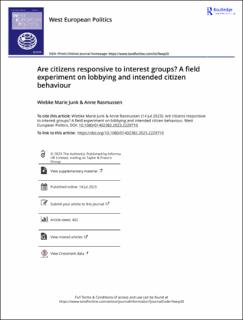Are citizens responsive to interest groups? A field experiment on lobbying and intended citizen behaviour
Journal article, Peer reviewed
Published version

Åpne
Permanent lenke
https://hdl.handle.net/11250/3091377Utgivelsesdato
2023Metadata
Vis full innførselSamlinger
Sammendrag
The ability to mobilise public opinion is central to interest group politics. Yet, whether and how groups succeed in swaying the public remains inconclusive. The article assesses this by conducting a field experiment in which a consumer group sent different versions of campaign material to a representative sample of over 5000 citizens. Relying on a two-wave panel survey, it shows that while the campaign affected intended consumer behaviour, it did not influence attitudes. Surprisingly, material by the organisation alone was more effective than material sent with a partner. Moreover, campaign references to personal experiences and facts were not more effective than material referring to public opinion. The findings challenge existing evidence on how sender and message characteristics affect the likelihood of influencing citizens. At the same time, they underline that public opinion is hard to change and have important implications for understanding political representation and interest groups in democratic politics.
